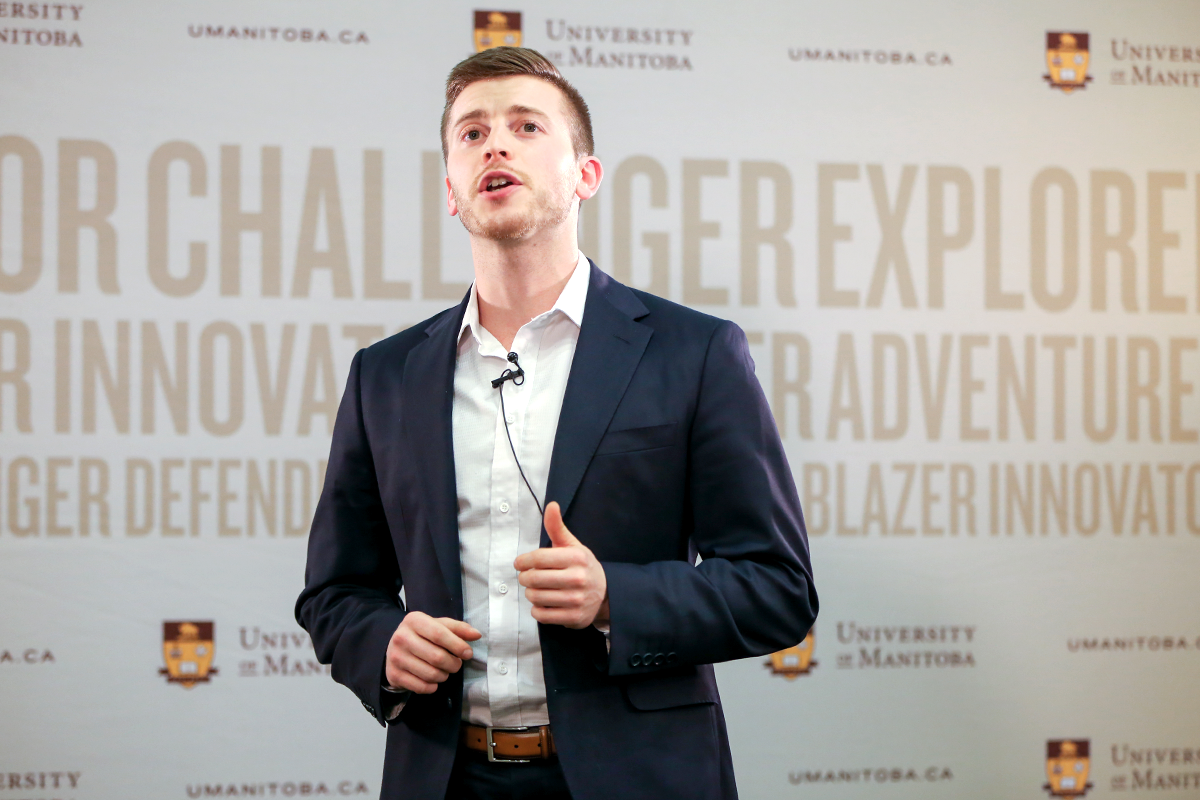
Kevin Boreskie PRESENTING AT THE 2018 THREE MINUTE THESIS (3MT®) COMPETITION.
Do we have to get old?
We’re all getting older, but some of us age faster than others.
It doesn’t have to be this way.
To clarify, general health and vigor decreases with age but everyone experiences this decline differently: some are more vulnerable to stressors and thus age faster.
Graduate student Kevin Boreskie views aging in terms of frailty, and used a simple, three-part plot: not frail, pre-frail, and frail. Pre-frailty is what policy-makers and doctors should home in on—it’s where exercise-based interventions can curb health decline and even restore health before the onset of chronic illnesses.
Boreskie is a 3MT finalist and master’s student in the Faculty of Kinesiology and Recreation Management working with professor Todd Duhamel. Under his leadership, in 2017 Boreskie led the largest clinical study in St. Boniface Hospital’s history in order to better understand cardiovascular disease and frailty, and what arrests their advance.
Current efforts to identify people at higher risk for cardiovascular disease focus on traditional risk factors, such as age, sex, smoking habits, blood pressure and cholesterol. That’s fine, but these assessments may miss prime heart attack candidates. Boreskie, therefore, developed a new paradigm.
He examined the links between pre-frailty and cardiovascular disease risk factors in 850 women aged 55 and older. Through a simple walking test, a handgrip strength test, and a questionnaire, Boreskie discovered novel associations between Pre-frailty and cardiovascular disease risk factors – ones current tests overlooked. What’s more, the simplicity of his test means clinics can easily adopt it to identify which patients are candidates for interventions.
Our healthcare system, Boreskie argues, is based on treating individual diseases as they appear. This approach will become less feasible with our aging population as more than 30 per cent of older adults in Canada live with more than one chronic disease. Boreskie’s goal is to prevent the onset of chronic illness where possible and his screening method will allow our health care system to do this through targeted interventions.
“When I was a kid I always wanted to be involved in sport somehow,” he says. “Through the courses I was taking at U of M I learned more about the variety of ways that physical activity could help people and what kind of role I could play in that area…. Physical activity is an effective means of improving so many facets of health, and in a cost-effective manner, yet it is still being under-utilized.”
Indeed, we’ve been arguing for exercise for a while: In the 18th century Scottish physician Dr. William Buchan wrote, “Of all the causes which conspire to render the life of a man short and miserable, none have greater influence than the want of proper exercise.”
To be sure, exercise will not lead us to the fountain of youth, but it will put us on the path to vitality. And Boreskie is helping people get back on that path.
Meet the other new faces of innovation and discovery.
Research at the University of Manitoba is partially supported by funding from the Government of Canada Research Support Fund.






